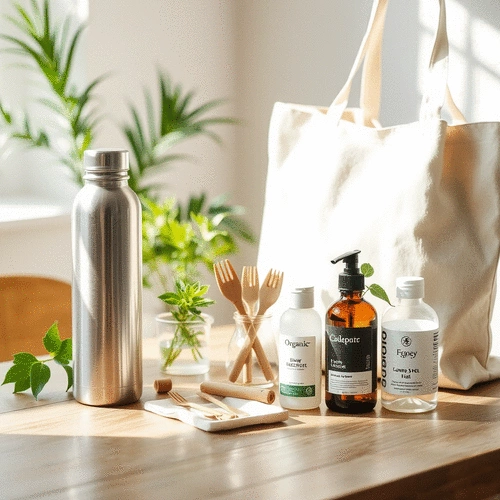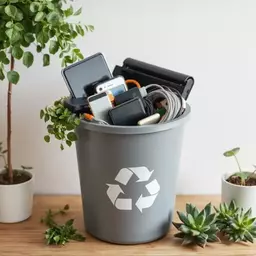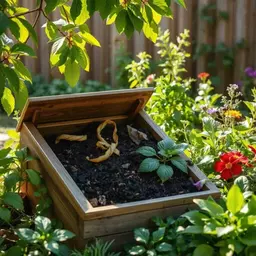In a world where consumer habits shape our environment, the importance of mindful consumption has never been clearer. How often do we stop to consider the impact of our choices on the planet? By engaging in mindful consumption, we can drive meaningful change—one purchase at a time.
What You Will Learn
- Mindful consumption promotes intentional buying habits, ensuring every purchase aligns with personal values and sustainability goals.
- Sustainable products have a lower environmental impact and often support ethical practices, contributing to a healthier planet for future generations.
- Familiarizing yourself with certifications like Fair Trade, USDA Organic, and B Corp can help you make informed choices that reflect your commitment to sustainability.
- Verifying product claims through trusted labels and third-party reviews can ensure you're supporting brands that prioritize ethical practices.
- Investing in sustainable products can lead to long-term savings and health benefits, while also supporting local economies and communities.
- Participation in the circular economy is essential for reducing waste and supporting global Sustainable Development Goals (SDGs) aimed at a better future.
Key Aspects of Mindful Consumption
Understanding the core elements of mindful consumption can significantly impact our choices and their effects on sustainability.
Awareness
Recognizing the effects of our choices.
Intentionality
Making deliberate decisions that echo our values.
Responsibility
Taking ownership of how our actions impact others.
Sustainable Product Benefits
Lower environmental impact compared to traditional products.
Understanding Mindful Consumption and Its Importance
In today’s fast-paced world, *mindful consumption* has emerged as a crucial aspect of sustainable living. It encourages us to think carefully about what we buy and how it affects the planet. At Eco Habits Daily, I believe that every choice we make, no matter how small, has the potential to contribute to a healthier environment!
Mindful consumption isn’t just about being eco-friendly; it’s about being intentional. This means considering the *entire lifecycle of a product*, from how it’s made to what happens when we no longer need it. By understanding this, we can make choices that support sustainability and align with our values. For more insights on intentional buying, explore our guide on mindful shopping for less waste.
Defining Mindful Consumption and Sustainable Living
So, what exactly do we mean by *mindful consumption*? It’s the practice of being aware of the impact of our purchases on the environment, society, and economy. This approach leads us to make more responsible decisions that help reduce waste and promote sustainability. Here are some key aspects to consider:
- Awareness: Recognizing the effects of our choices.
- Intentionality: Making deliberate decisions that echo our values.
- Responsibility: Taking ownership of how our actions impact others.
As we embrace these ideas, we can transition towards *sustainable living*, which focuses on minimizing our ecological footprint while still enjoying life’s conveniences. It’s about finding that balance!
The Significance of Choosing Sustainable Products
Choosing sustainable products is vital for several reasons. Firstly, these products typically have a lower environmental impact compared to their traditional counterparts. By opting for items that are made with eco-friendly materials and ethical practices, we're helping to preserve our planet for future generations. Here’s why this matters:
- Protecting the environment: Sustainable products generally use less energy and fewer resources during production.
- Supporting ethical practices: Many sustainable brands prioritize fair wages and safe working conditions.
- Encouraging innovation: The demand for sustainable options drives companies to innovate and adopt greener practices.
At Eco Habits Daily, I encourage readers to think critically about their purchases. By making informed choices, we can collectively foster a *more sustainable economy* and encourage businesses to prioritize the planet. Each purchase becomes a vote for the kind of world we want to live in! To learn more about living sustainably, check out these easy eco-friendly habits to start.
Pro Tip
Did you know? When shopping for sustainable products, consider creating a "sustainable shopping list." This list not only helps you stay focused on eco-friendly options but also minimizes impulse purchases that can lead to waste. By planning ahead, you can be more intentional about your buying choices and make a significant impact on your consumption habits!
Understanding Certifications and Labels for Sustainable Products
When it comes to making informed choices about sustainable products, understanding certifications and labels is critical. These certifications help us identify products that meet specific environmental and ethical standards. They also give us peace of mind, knowing we're supporting companies that prioritize sustainability in their practices.
As you navigate the store aisles or browse online, it's essential to familiarize yourself with the most reputable certifications. Each label represents different aspects of sustainability and ethical production, giving you a clearer picture of what you're purchasing.
Comparing Popular Certifications: Fair Trade, USDA Organic, and B Corp
Let’s take a closer look at some well-known certifications that can guide your purchasing decisions:
- Fair Trade: This certification ensures that producers receive fair wages and work under safe conditions. It supports farmers and workers, promoting sustainable practices in developing countries.
- USDA Organic: Products with this label are grown without synthetic pesticides, fertilizers, or genetically modified organisms. Choosing USDA Organic means you're opting for healthier food options that are better for the planet.
- B Corp: Certified B Corporations meet high standards of social and environmental performance. This label shows that the company is committed to balancing profit and purpose.
By understanding these certifications, you can make choices that align with your values while supporting sustainable practices. It’s a small step that can lead to meaningful changes in your lifestyle!
How to Verify Product Claims Through Trusted Labels
Sometimes companies make bold claims about their products, but not all of them are genuine. Here are some practical steps for verifying product claims:
- Look for recognized certifications on the packaging.
- Research the brand’s mission and values on their official website.
- Check third-party resources and reviews to gauge credibility.
By taking these steps, you can feel confident that your purchases reflect your commitment to the environment. At Eco Habits Daily, I always encourage readers to dig a little deeper. It's worth it! For further reading on reducing waste, consider our guide on eco-friendly junk removal.
The Importance of Green Certifications and Eco-Labeling
Green certifications and eco-labels play a vital role in the marketplace. They provide a clear indication of a product’s environmental impact, helping consumers like you make informed choices. Not only do these certifications promote transparency, but they also encourage companies to adopt more sustainable practices.
By choosing products with reliable eco-labels, you support brands that are committed to protecting our planet. This not only reduces your ecological footprint but also drives demand for sustainable products, encouraging even more companies to follow suit. Together, we can create a positive ripple effect in the marketplace!
Encouraging Sustainable Habits and Future Actions
As we all know, the journey to mindful consumption is a marathon, not a sprint. Understanding the long-term benefits of sustainable choices can help motivate us to stick with them. It’s about seeing the bigger picture and recognizing that every small action contributes to a healthier planet.
So, how can we truly evaluate the cost-effectiveness of our sustainable choices? Here are some points to consider:
- Investment in Quality: Sustainable products may have a higher upfront cost but often last longer, saving you money in the long run.
- Health Benefits: Choosing organic or sustainably sourced products can lead to healthier eating habits, which can reduce health care costs.
- Community Support: Buying local and ethical products supports your community, creating a more resilient economy.
Call to Action: Take Steps Towards Mindful Consumption Today
Every small step counts! I invite you to think about how you can incorporate more mindful consumption into your daily life. Start by making a conscious choice on your next shopping trip or exploring local farmers’ markets. Remember, the journey to sustainability is all about progress, not perfection.
Let’s inspire one another to make better choices! Whether it’s sharing tips with friends or supporting ethical brands, we can build a community that prioritizes sustainability and mindful living. Explore more about mindful consumption made simple for everyday application.
Exploring the Circular Economy and Sustainable Development Goals (SDGs)
Finally, let’s talk about the exciting concept of the circular economy. This model emphasizes keeping products in use for as long as possible, reducing waste, and reclaiming materials. By embracing the circular economy, we can contribute to global Sustainable Development Goals (SDGs) that aim for a better future for everyone.
At Eco Habits Daily, I believe that understanding and participating in the circular economy can be a game-changer. It's all about making choices that not only benefit us today but also pave the way for future generations! Together, let’s strive for a sustainable world, one mindful choice at a time. For more information on reducing your impact, see our article on mindful eco-friendly living tips.
Recap of Key Points
Here is a quick recap of the important points discussed in the article:
- Mindful Consumption: It's about being intentional with our purchases and considering the entire lifecycle of products.
- Sustainable Products: Choosing eco-friendly items helps protect the environment, supports ethical practices, and encourages innovation.
- Certifications Matter: Familiarizing yourself with certifications like Fair Trade, USDA Organic, and B Corp can guide your purchasing decisions.
- Verify Claims: Look for trusted labels, research brands, and check third-party resources to confirm product claims.
- Long-Term Benefits: Sustainable choices can lead to better health, community support, and long-term savings despite higher upfront costs.
- Circular Economy: Embracing this model helps reduce waste and supports Sustainable Development Goals for a better future.
Frequently Asked Questions (FAQs) about Mindful Consumption
- What is mindful consumption?
- Mindful consumption is the practice of being aware of the environmental, social, and economic impact of your purchases, making intentional decisions that align with your values and sustainability goals.
- Why is choosing sustainable products important?
- Choosing sustainable products helps protect the environment by reducing energy and resource consumption, supports ethical labor practices, and encourages innovation in eco-friendly production methods.
- How can certifications like Fair Trade, USDA Organic, and B Corp help me?
- These certifications act as reliable indicators that a product or company meets specific environmental, social, or ethical standards. They provide assurance that your purchases support responsible practices.
- How can I verify product claims about sustainability?
- To verify claims, look for recognized certifications on packaging, research the brand's mission and values on their official website, and consult third-party resources and reviews for credibility.
- What are the long-term benefits of making sustainable choices?
- Sustainable choices can lead to long-term financial savings (due to product durability), improved health (from organic products), stronger local economies (by supporting ethical brands), and a healthier planet for future generations.
- What is the circular economy and how does it relate to mindful consumption?
- The circular economy is a model that aims to keep products and materials in use for as long as possible, reducing waste and regenerating natural systems. Mindful consumption supports this by encouraging the purchase of durable, reusable, and recyclable products, thus contributing to global Sustainable Development Goals.










